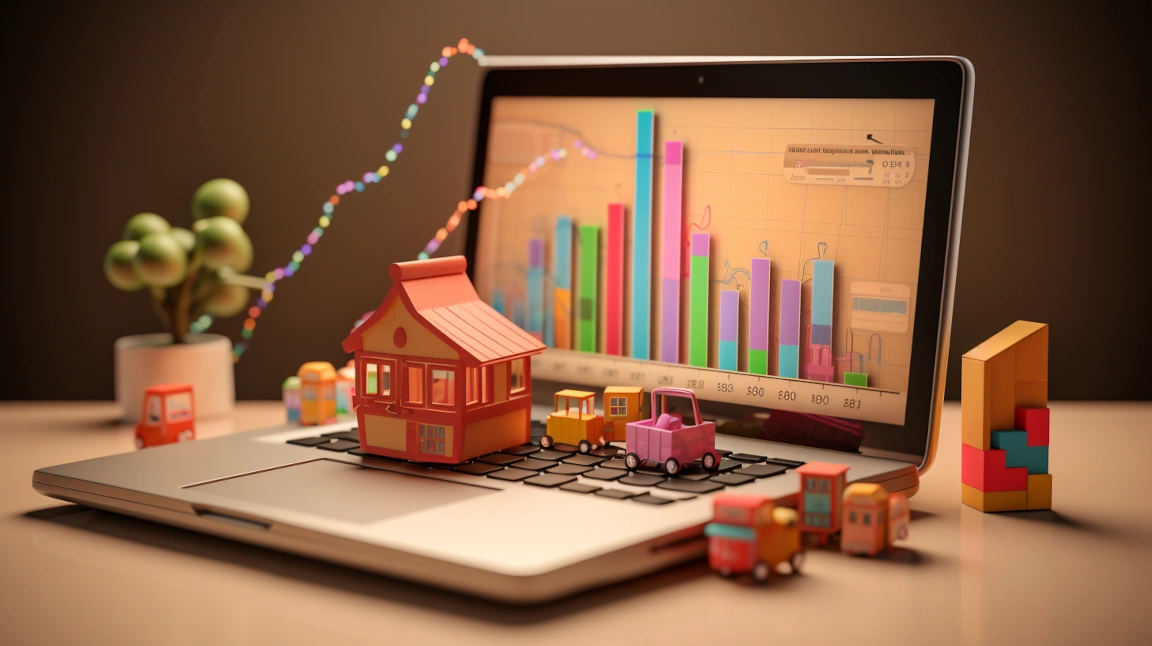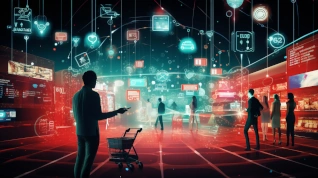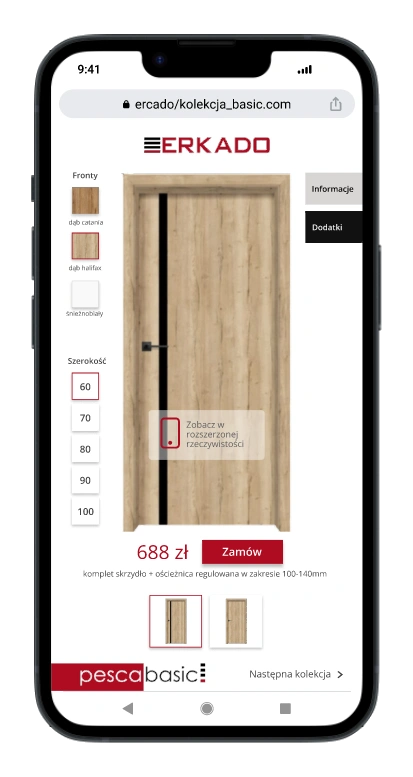3D for e-commerce: how to increase sales with visualization?

In the era of digital commerce, where competition is at an all-time high and customer expectations are rising, the use of innovative technologies is becoming a key factor in e-commerce success. 3D visualization in the world of online sales opens up new possibilities, not only enhancing the appeal of products, but also improving the entire shopping process. In our article, we will explore how advanced visualization techniques such as 3D models, AR and VR are revolutionizing e-commerce, from product presentation to integration with ERP and CRM systems. Find out how these technologies can not only make your product catalog more attractive, but also help increase sales efficiency, reduce costs and optimize business processes.
3D visualization, or actually what?
3D visualization is a technology that is revolutionizing the way we present and experience products in the digital world. No longer is it just a flat graphic on a screen; 3D visualizations allow us to create a realistic, three-dimensional image of a product that users can view from all sides, as if they had it in their hands. With this technology, a potential customer can closely examine every detail of a product by rotating and zooming in on it, allowing for a more complete understanding of its features and functions. 3D visualizations make the products on the screen more "tangible" bringing the online shopping experience closer to that of a stationery store and even surpassing it, offering opportunities unavailable in traditional commerce.
The power of 3D visualizations in e-commerce
3D visualizations are changing the face of e-commerce product pages, transforming them from simple catalogs into dynamic, interactive experiences. With 3D models, customers can not only see the product, but also 'feel' it virtually, increasing their trust and interest. The interactivity offered by 3D visualizations allows customers to examine a product in detail, which is especially important for items with complex designs or multiple variants. This advanced presentation not only makes it easier for customers to make purchasing decisions, but alsoincreases conversions on product pages, making them more attractive and useful.
See also: benefits of introducing AR in e-commerce.
Bringing your product catalog to life: interactivity and detail in a 3D product configurator for e-commerce
The use of 3D visualization in product catalogs is not only a step toward modernity, but more importantly a way to bring your offerings to life and stand out from the competition. Presenting products in full 3D form with options to rotate and zoom in allows customers to see the product in detail, even if they can't physically touch it. This allows them to see how the product will look in different configurations, which is especially important when selecting products with multiple variations, such as furniture or electronics. This depth and detail of presentation not only makes the catalog more attractive, but also translates into greater customer engagement and increased sales, offering them a unique and complete shopping experience.
Saving time and increasing efficiency: automating the sales process
Automating the sales process with 3D product configurators is revolutionizing the way companies manage their resources and serve customers. Using AR and VR technologies, configurators allow customers to design and customize products themselves according to their needs, significantly saving sales staff time. This allows employees to focus on more valuable aspects of their work, such as building customer relationships or developing sales strategies. In addition, interactive 3D tools allow for quick and efficient product presentations, reducing the time needed to provide information and answer customer questions. All this translates into increased efficiency of the entire sales process, which is invaluable in the fast-paced and dynamic world of e-commerce.
3D for e-commerce: reducing costs and optimizing warehousing
Custom product creation supported by AR and VR technologies, is a way to significantly reduce operating costs and optimize warehousing processes. With 3D visualizations and configurators, customers can order products that are precisely tailored to their needs, allowing companies to produce according to actual demand rather than based on predictions. This, in turn, reduces costs associated with overstocking, logistics and managing excess products. The use of augmented reality in the configuration process allows customers to further tailor the product to their space and needs, resulting in higher purchase satisfaction and fewer returns. This approach not only reduces costs, but also promotes more sustainable production and trade.
Minimizing production errors
The use of visual configuration through augmented reality is crucial in minimizing manufacturing and human errors. Accurate visualizations enable customers to accurately design and visualize a product before it is made, helping to eliminate misunderstandings and communication errors. Such tools also make it possible to precisely match dimensions and specifications, which is especially important in industries where accuracy is critical, such as in furniture and electronics manufacturing. In addition, the use of AR allows a product to be"tried on" in the customer's real-world environment, ensuring that the final product meets expectations. Visual configuration therefore contributes to a significant reduction in errors and the costs associated with correcting them, resulting in higher quality customer service and production efficiency.
Integration and automation in e-commerce: connectivity with ERP and CRM
Integrating product visualization with e-commerce systems and interfacing with ERP (Enterprise Resource Planning) and CRM (Customer Relationship Management) systems opens up new opportunities for efficiency and data management. This combinationallows product information to be automatically updated throughout the system – from warehouse to sales to customer service. As a result, when a customer configures a product on the website, all of his preferences are automatically recorded and transferred to the ERP system, making it possible to quickly prepare an offer and reduce lead times. Integration with the CRM system, in turn, makes it possible to collect and analyze data on customer preferences and behavior, which is invaluable for creating personalized offers and marketing campaigns. This synergistic effect of technology not only increases sales, but also builds lasting relationships with customers, providing them with personalized solutions and improving the overall buying process.
3D visualization as key to e-commerce success
A full 3D product presentation in e-commerce is key to increasing conversions and improving the shopping experience of online customers. With realistic presentations, consumers can see the product in detail, reducing uncertainty and increasing trust in the brand. Detailed 3D models allow consumers to virtually "touch" and explore a product, which is especially important for items where appearance and details have a significant impact on the purchase decision. Allowing customers to see the product in such detailincreases the likelihood of purchase and reduces the number of returns, as customers know exactly what to expect. In addition, impressive visualizations can serve as a powerful marketing tool, attracting attention and generating website traffic, which directly translates into higher sales. In the age of digital competition, 3D visualizations are not only an innovative solution, but an essential part of an e-commerce strategy that helps differentiate an offer in the market and increase customer satisfaction.
Do you like the post? Share to others!

Krzysztof Basista
COO
For years, he has been involved in AR / VR projects ranging from entertainment to heavy industry. Always looking for problem solving through technology.
Contact us
Related posts

Today, retail stands at the crossroads between adaptation and revolution, facing rapidly changing technological trends. In our article today, we will explore how modern...

Augmented reality (AR) is a technology that combines the physical and digital worlds to create an interactive experience. AR technology is used in a variety of industries...

Have you ever wondered how to make your product stand out in the thicket of competition that is constantly flooding the market? How to make it your novelty that catches...

AR glasses, also known as augmented reality glasses or mixed reality glasses, are wearable devices that overlay digital information onto the user's real environment...

Not so long ago, augmented reality was a science fiction subject, fascinating but distant. Today, it is at our fingertips, literally. Our smartphones...

3D AR configurators, combining augmented reality technology with 3D modelling, are becoming increasingly popular in industries ranging from furniture to automotive.






